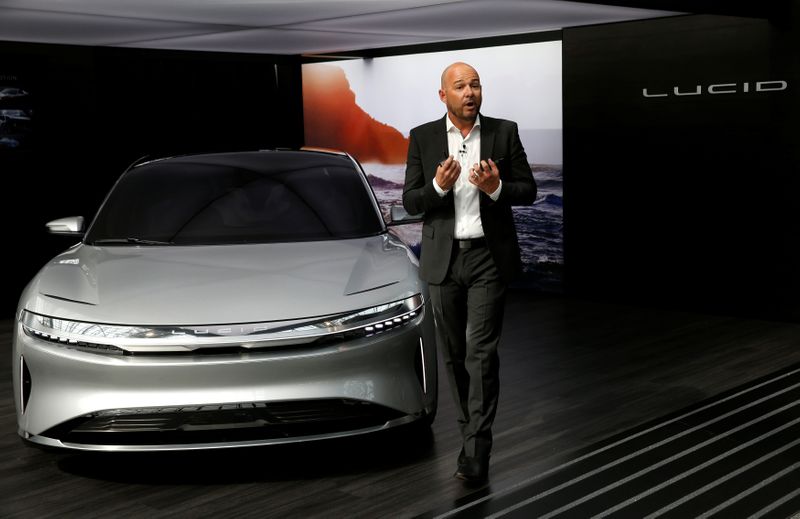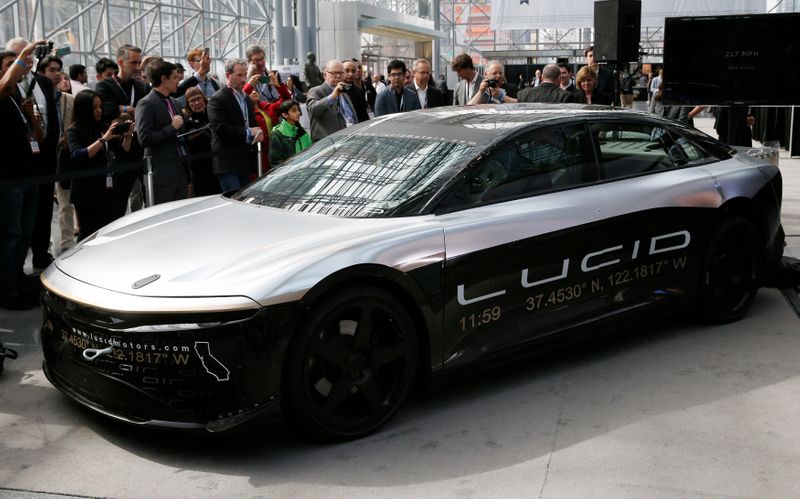By Akanksha Rana and Noor Zainab Hussain
(Reuters) - Stock market investors valued electric vehicle maker Lucid Motors at $62 billion on Tuesday after a deal to merge with blank check firm Churchill Capital IV, sparking some concerns about the real worth of the company which has yet to start regular production.
In comparison, General Motors Co (NYSE:GM) was worth about $72.5 billion at mid-day Tuesday, while China's leading electric car maker Nio (NYSE:NIO) Inc was valued at $72 billion.
Shares in Elon Musk's Tesla (NASDAQ:TSLA), which have surged more than 10 times in value over the past year to around $900, fell for a second day in a row on Tuesday, with its mid-day shares at $674 and its market capitalization at $647 billion.
Lucid's first electric car, the luxury Air, won't go in production now until late 2021, later than the spring 2021 launch initially planned, the company said in a filing. Officials on Tuesday said they do not expect Lucid to be cash-flow positive until 2025.
Shares of Churchill Capital IV Corp fell more than 40%, a day after it agreed the merger with Lucid. At mid-day, CCIV shares had recovered slightly to $39.00, down 32%.
The Lucid-CCIV deal includes new private investment that valued the company at $24 billion, just a fraction of Tesla, but still the biggest ever involving so-called special purpose acquisition companies (SPACs).
"We're bringing the world's best technology to the market this year, here in the U.S. I think the valuation is a reflection of our technology," Chief Executive Officer Peter Rawlinson told CNBC on Tuesday when asked whether Lucid's valuation made him nervous.
Rawlinson told investors on a call that its Lucid Air Dream edition is virtually sold out, while former Citigroup (NYSE:C) banker Michael Klein, head of Chruchill Capital, said the company has sufficient funding for its first three models.
TIME FOR A CORRECTION?
Rawlinson said that the carmaker expects production of a less expensive, sub-$70,000 version of the luxury sedan in 2022, followed by a new model code-named Project Gravity in 2023.
The recent run-up in valuations of several EV startups, including Nikola Corp and Lordstown Motors, that have yet to produce saleable vehicles or meaningful revenue, has drawn comparisons to the dotcom bubble of 1999-2000, with analysts and investors expecting a near-term correction.
"The EV sector feels like it’s going through a correction. Lucid’s SPAC-IPO probably (is) driving circular negative reinforcement," said Roth Capital Partners analyst Craig Irwin.
"We think Tesla has been valued for teleportation, so the correction is probably a very healthy thing. This allows investors to watch for potential entry points in names they feel they might have missed," he added.
Lucid, run by ex-Tesla engineer Rawlinson, is the latest EV firm to tap U.S. capital markets, with investors rushing into the sector as tougher emission norms drive a switch to electric vehicles.
With its roster of deep-pocketed financial backers, it is one of the strongest of the flock of startups challenging Tesla's dominance.
After Lucid priced its Air sedan, starting at $77,400, Musk announced a price cut to its flagship Model S sedan. "The gauntlet has been thrown down!" he tweeted.
However, Lucid's five-year timeline to get to production of 250,000 vehicles a year is a reminder of the challenges of scaling up mass production in the auto industry.

Tesla, founded in 2003, produced about 500,000 electric vehicles last year.
